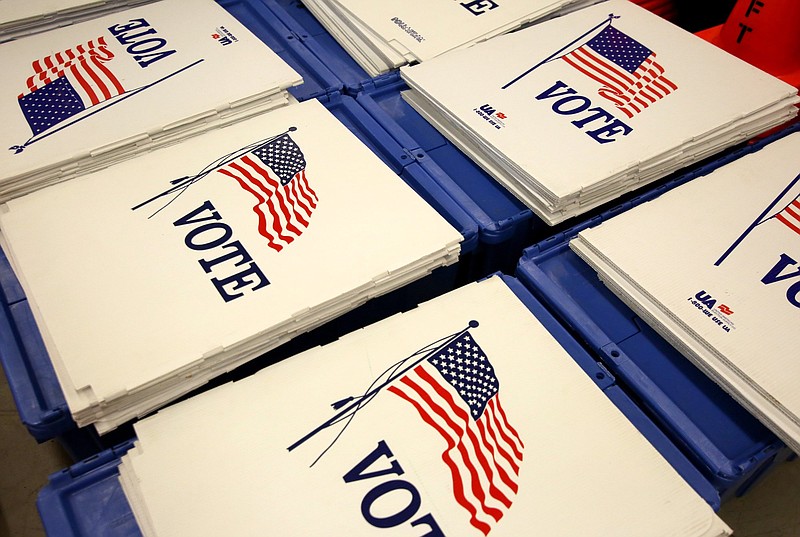NASHVILLE - In a state where an estimated 323,354 felons have completed their criminal sentences, two Republican lawmakers and a coalition of groups are pressing a bill to streamline what they describe as Tennessee's "onerous" current process for restoring felons' voting rights.
"We're not creating a new eligibility class at all," Rep. Michael Curcio, R-Dickson, said Wednesday at a news conference. "These are folks we've already said, with sort of one hand behind our back with our fingers crossed, 'You're eligible.' We've just put a lot of paper burdens here and there so most folks don't ever actually get to achieve that."
Tennessee currently has the fourth highest disenfranchisement rate in the country, more than triple the national rate, proponents say. There are reasons for it, supporters of the bill say.
Current Tennessee laws require persons convicted of felonies who've served their sentences and completed probation or parole to be current on all court-ordered child-support obligations before trying to get their voting rights restored.
Anyone convicted of any felony also has to have dealt with various court fees as well as fines before they can try.
The bill won't impact the requirement to pay child support or court fines and fees. But it repeals current law which says their voting rights can be denied until they do.
Critics, meanwhile, say the current process is confusing and cumbersome, involving as many as a dozen state and local agencies, ranging from the Tennessee Secretary of State's office, which oversees elections, to the state Department of Correction, courts and 95 county-level election offices.
"The rights restoration process in Tennessee is the definition of overly burdensome and complex," said Colin Weaver, states director for Secure Democracy, a national group that has been involved in similar felon voting restoration efforts in states like Florida. "Just looking at the list of government agencies and entities involved is dizzying."
The Volunteer State, meanwhile, is the only state in the nation to have the child-support back payment provision. And about one in five black Tennesseans are disenfranchised, making the state one of just four states with a black disenfranchisement rate above 20 percent, according to Think Tennessee, a state-based think tank that has studied the issue.
Proponents of the legislation include Americans for Prosperity Tennessee, funded by the conservative billionaire Koch brothers, and the liberal American Civil Liberties Union Tennessee as well as advocates and prison re-entry experts.
They and others participated in the news conference at the state Capitol complex. Among them was Matthew Charles, a formerly incarcerated felon in Tennessee, imprisoned on a 1995 federal crack cocaine trafficking charge.
Charles was a guest of President Donald Trump at his recent State of the Union speech. Trump in December signed into law the landmark First Step Act. It allows thousands of people convicted of drug crimes to earn earlier releases from prison.
"Americans believe in second chances," said Charles, who became religious during his years of incarceration in prison. "Christians believe in second chances."
Being able to once again vote is an important rite of passage for former felons, Charles said. Along with other actions like successfully finding work, he said, it helps restore "dignity."
Proponents say rights restoration would also save taxpayer dollars and cut down on former felons committing new crimes and returning to prison. The state ranks 40th on its recidivism rates.
AFP-Tennessee state director Tori Venable said it should be no surprise the organization supports the legislation, sponsored by Sen. Steve Dickerson, R-Nashville, in the upper chamber. The national AFP backed the federal "First Step" law, she noted.
Restoring voting rights as well as being able to obtain a driver's license "restores dignity," she said. "Government should not be a burden on its citizens."
Hedy Weinberg, executive director of ACLU-Tennessee, said Tennessee's disenfranchisement laws are "among the most complicated and onerous in the country. Three-quarters have completed their sentences yet are still unable to vote due to Tennessee's burdensome restoration process."
She said it's "only their economic status that prevents them from getting their rights restored."
Over the last quarter century, an average of fewer than 500 people in Tennessee have their rights restored annually despite there being over 320,000 eligible residents who have completed their sentences, according to Think Tennessee, which partnered with AFP and another group, Project Return, on the report.
"The denial of voting rights post-incarceration does nothing to preserve public safety or improve the health and well-being of our community," said Bettie Kirkland, executive director of Project Return, which helps felons upon their release.
Kirkland said it serves to "exclude the tax-paying citizens among us who have paid their debt to society and who want nothing more than to leave prison behind."
The bill wouldn't apply to some crimes, including murder and sex crimes.
Dickerson called the current process for reinstating voting rights "incredibly onerous," noting it "effectively results in the permanent disenfranchisement of people convicted of felony offenses."
It's not only difficult for people with convictions, Dickerson said, "it's doubly burdensome for our Tennessee officials who have to jump through bureaucratic hoops to get this paperwork processed."
The bill is one of several seeking to deal with restoration of voting rights for those convicted of felonies.
Contact Andy Sher at asher@timesfreepress.com or 615-255-0550. Follow him on Twitter @AndySher1.
